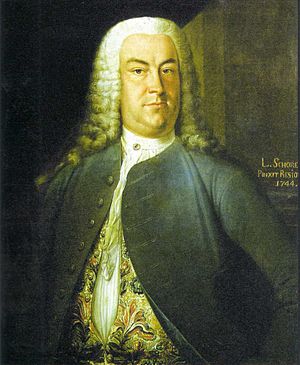Johann Christoph Gottsched facts for kids
Quick facts for kids
Johann Christoph Gottsched
|
|
|---|---|

Portrait by Leonhard Schorer, 1744
|
|
| Born | 2 February 1700 Juditten, Brandenburg-Prussia
|
| Died | 12 December 1766 (aged 66) Leipzig, Saxony
|
| Alma mater | University of Königsberg |
Johann Christoph Gottsched (born February 2, 1700 – died December 12, 1766) was an important German thinker, writer, and critic. He lived during the time of the Enlightenment, a period when new ideas about reason and knowledge became very popular. Gottsched worked hard to improve German literature and theater.
Contents
Biography
Early Life and Studies
Johann Christoph Gottsched was born in Juditten, near Königsberg (now Kaliningrad), in what was then Brandenburg-Prussia. His father was a Lutheran clergyman. Gottsched studied philosophy and history at the University of Königsberg.
In 1723, after finishing his degree, he moved to Leipzig. He did this to avoid being drafted into the Prussian army. In Leipzig, he was helped by Johann Burckhardt Mencke, a well-known poet. Gottsched soon became the leader of a poetry society there. He later reorganized it and called it the Deutsche Gesellschaft (German Society).
Career and Reforms
Gottsched began his career by writing for weekly magazines like Die vernünftigen Tadlerinnen (1725–26). He used these writings to criticize the overly fancy and sometimes silly styles of writing common at the time. He believed that German literature should follow clear, strict rules. He wanted German writing to be like French classicism, which focused on order and reason.
Gottsched set rules for writing plays. He said that serious plays should not have silly jokes or over-the-top acting. He also insisted that plays should follow the "dramatic unities." This meant a play should happen in one place, over a short time, and have only one main story.
His first wife, Luise Gottsched, was a talented writer and translator. She helped him a lot with his efforts to improve German theater. They worked with theater managers to change what people saw on stage. Instead of popular musical shows, they brought in translations of French plays and new German plays. They also got rid of the silly character called Hanswurst (like a "Jack Pudding") from serious plays.
Academic Life and Later Challenges
In 1730, Gottsched became a professor of poetry at the University of Leipzig. Later, in 1734, he became a full professor of logic and metaphysics. He was also a member of an important learned society in Olomouc.
However, Gottsched's strict ideas eventually caused problems. He did not appreciate the works of new writers like Klopstock and Lessold. In 1740, he had a big disagreement with Swiss writers who believed that poetic imagination should not be limited by too many rules. They pointed to English poets, like Milton, as examples of creative freedom. Gottsched, however, stuck to his belief that poetry must follow rules. He lost this argument, and his influence began to decline.
In 1741, he also had a disagreement with Caroline Neuber, a theater manager he had worked with. His reputation suffered, and he became known for being overly pedantic. He died in Leipzig on December 12, 1766.
Works
Gottsched's most important work was Versuch einer kritischen Dichtkunst für die Deutschen (1730). This was the first detailed book in German about the art of poetry. It was based on the ideas of the French writer Boileau.
His books Ausführliche Redekunst (1728) and Grundlegung einer deutschen Sprachkunst (1748) were important for developing German writing style. They also helped to make the German language purer.
Gottsched wrote several plays. His play Der sterbende Cato (1732) was very popular for a long time. It was based on an English play by Joseph Addison. His collection Deutsche Schaubühne (6 volumes, 1740–1745) included many translated French plays. It also had some plays written by him, his wife, and others. This collection helped to give the German stage a set of classic plays.
He also created a huge list of German plays called Nötiger Vorrat zur Geschichte der deutschen dramatischen Dichtkunst (1757–1765). Even though it's not complete, it is still very useful today. Gottsched also edited several magazines that focused on literary criticism.
Interestingly, Gottsched wrote the words for two musical pieces by the famous composer Johann Sebastian Bach. These were Laß, Fürstin, laß noch einen Strahl (BWV 198) and Willkommen! Ihr herrschenden Götter der Erden (BWV Anh. 13), though the music for the second one is now lost.
Family
His first wife, Luise Kulmus, was also a well-known writer. She passed away in 1762. After three years, in 1765, Gottsched married his second wife, Ernestine Susanne Katharina Neunes. She was 19 years old at the time.
Images for kids
-
Die Gottschedin, his first wife, Luise Adelgunde Victorie Gottsched (born Kulmus) in an oil portrait by Elias Gottlob Haussmann c.1750
See also
 In Spanish: Johann Christoph Gottsched para niños
In Spanish: Johann Christoph Gottsched para niños
 | Delilah Pierce |
 | Gordon Parks |
 | Augusta Savage |
 | Charles Ethan Porter |



